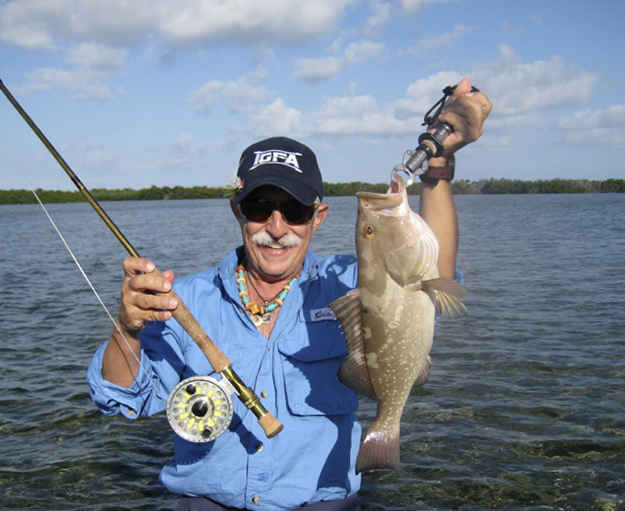It’s in the details of the leader build
By Skip Clement, Contributor
 [dropcap]F[/dropcap]olks of the Judeo-Christian tradition only need ten mitzvahs/commandments to guide their life; for Alcoholics Anonymous, only 12 precepts to conduct their lives, but for the International Game Fish Association (IGFA) 14 rules are not nearly enough. There are a lot of caveats required just to fly fish, so, it is complicated – this fly fishing by the rules. Or is it?
[dropcap]F[/dropcap]olks of the Judeo-Christian tradition only need ten mitzvahs/commandments to guide their life; for Alcoholics Anonymous, only 12 precepts to conduct their lives, but for the International Game Fish Association (IGFA) 14 rules are not nearly enough. There are a lot of caveats required just to fly fish, so, it is complicated – this fly fishing by the rules. Or is it?
Many anglers are unhappy with the IGFA Fly Fishing Rules, especially those with billfish on their minds, or any big boy fish – like the toothy king mackerel or world-class hook throwing champions, tarpon.
There does not seem to be much or any story noise reported about IGFA Fly Fishing Rules in the trout world. Primarily, the rigging for trout is almost always by the rules, even if the angler never heard of the IGFA Fly Fishing Rules.
Too, many offshore anglers, as well as anglers that pursue smaller game fish on the fly, are all in on angling rules according to IGFA. One of the most famous billfish captains of all time, George Sawley, says if you’re not IGFA rigged, you’re not even fly fishing (paraphrasing). He was not referring to world records, tournament pursuits, just everyday angling for any “fish.”
Understanding the rules will make sense of them
Getting your arms around the rules lies with the legalize writing of the regs. Boiled down, the IGFA Fly Fishing Rules have little to do with your fly rod if it’s over 6-feet and has a certain butt and handle measurement, or backing and fly line. You’re free to use a flagpole as your fly rod, piano wire for backing and steel cable as your fly line. Also, the rules have little to do to with connections. There, you could use welded chain links – anything. IGFA’s escape, “ . . . according to accepted practices.” Regarding the latter, if an industry player of note came out with something outside the description currently in IGFA’s “rules,” it would fast become “accepted practices.”
However, don’t get your undies in a bunch, the reality is that it’s all about the details of the leader build – and the IGFA is not going to change a word of that. Their rules have been assailed many times before with no new outcomes

Above, world record red grouper 3-pounds on 6-pound tippet (12/20/2007). Marty Arostequi, a retired physician from Coral Gables, Florida, has more world records on a fly than anyone, ever, around 400. There almost is no one in second place. Arostegui says he spends more time researching potential records than fishing for them. Steve Kantner, Ft. Lauderdale, guided Marty to some of his world record catches. Click on image to read Steve’s story about Marty. Image credit courtesy of Marty Arostequi.
Criticisms
The IGFA has addressed the only two main arguments about pursuing world records having, in the minds of the finger pointers, adverse outcomes for the anglers prey.
• One, killing prime specimens, like bluefin tuna, which could have bred millions more “selfies.” One such argument against the IGFA was lead by an academic and his disciples (Shiffman et al.). Mr. Shiffman’s evidence turned out to have keystones of false research conclusions. The professor wanted an outcome that he pre-determined, not a reality.
Read the rejoinder to Shiffman, “Trophy fishing for species threatened with extinction: A way forward building on a history of conservation” by Jason Schratweiser.
• The other argument has been about catching and landing a fish on under-gunned pound test class tippets with the assumption that it always leads to mortality. That battle cry drifts into so many catching and handling articles about dos and don’ts that we’re lead to conclude mortality is assured because “there always is” an extended fight.
Well, it’s the jump to conclusions, embrace a conspiracy, and torment the facts that sustain a lot of people these days
I interviewed IGFA’s Jack Vitek, overseer of record submissions and approvals of submitted evidence that a world record has been achieved. It’s a complicated job, sometimes requiring a Holmes and Watson approach.
World records are the original taproot of Michael Lerner’s (founder) IGFA.
With a slight chuckle, Vitek said: “Funny; it’s big, ALL TACKLE animals caught with a heavy line that seem more likely to fall into the extended fight category. Paradoxically, game fish caught on light pound test class tippets does not automatically translate – prolonged, exhaustive fish fight. There are so many records for pretty big fish being caught on very light tippets landed in just a few minutes, or a very short, non life threatening amount of time.”
I asked about bonefish?
Jack said, “Bonefish are more susceptible to stress issues when fought, but with them and other species, there are other factors like handling (slime), holding, and the all-important time sensitive return to the water that factor big in its survival. A good angler, using a light tippet, knows that they have to pay attention not only catching but catching quickly because of predation, as well as a timely release.”
A peek at rule “B” (the Leader). It reads complicated, but it is not
Leaders must conform to generally accepted fly fishing customs.
 A leader includes a class tippet and, optionally, a shock tippet. A butt or taper section between the fly line and the class tippet shall also be considered part of the leader and there are no limits on its length, material, or strength. A class tippet must be made of nonmetallic material and either attached directly to the fly or to the shock tippet if one is used. The class tippet must be at least 15 inches (38.10 cm) long (measured inside connecting knots). With respect to knotless, tapered leaders, the terminal 15 inches (38.10 cm) will also determine tippet class. There is no maximum length limitation. A shock tippet, not to exceed 12 inches (30.48 cm) in length, may be added to the class tippet and tied to the lure. It can be made of any type of material, and there is no limit on its breaking strength. The shock tippet is measured from the eye of the hook to the single strand of class tippet and includes any knots used to connect the shock tippet to the class tippet. In the case of a tandem hook fly, the shock tippet shall be measured from the eye of the leading hook. Click here to read the IGFA Fly Fishing Rules . . .
A leader includes a class tippet and, optionally, a shock tippet. A butt or taper section between the fly line and the class tippet shall also be considered part of the leader and there are no limits on its length, material, or strength. A class tippet must be made of nonmetallic material and either attached directly to the fly or to the shock tippet if one is used. The class tippet must be at least 15 inches (38.10 cm) long (measured inside connecting knots). With respect to knotless, tapered leaders, the terminal 15 inches (38.10 cm) will also determine tippet class. There is no maximum length limitation. A shock tippet, not to exceed 12 inches (30.48 cm) in length, may be added to the class tippet and tied to the lure. It can be made of any type of material, and there is no limit on its breaking strength. The shock tippet is measured from the eye of the hook to the single strand of class tippet and includes any knots used to connect the shock tippet to the class tippet. In the case of a tandem hook fly, the shock tippet shall be measured from the eye of the leading hook. Click here to read the IGFA Fly Fishing Rules . . .
[information]
To join IGFA or just visit, click here . . .
Jack Vitek, IGFA’s world-records coordinator: 954-924-4246 or email him.
[/information]



